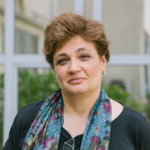
Adriana Martins is Associate Professor with aggregation at the Faculty of Human Sciences, Universidade Católica Portuguesa (UCP). She holds a PhD in Comparative Literature from Universidade Católica Portuguesa, where she also obtained her Habilitation in Culture Studies. She coordinates the scientific area of Culture Studies since 2019. Between 2011 and 2019 she was the FCH International Relations Coordinator. She has taught in the Universities of Utrecht (The Netherlands), LUMSA (Italy) and Pázmány Péter Catholic (Hungary). She is a Senior Member of CECC, integrating the team of the research line on Culture, Art and Conflict. She has published widely on Culture Studies with a focus on Film Studies and on Comparative Literature.
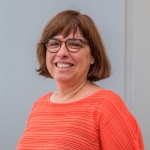
Alexandra Lopes holds a PhD in Translation Studies from UCP. She is currently Associate Dean of the Faculty of Human Sciences and member of the Research Centre for Communication and Culture. At the Centre, she coordinates the research group ‘Literature and the Global Contemporary’.
Her most recent publications include the co-edition of The Age of Translation. Early 20th-century Concepts and Debates (Peter Lang, 2017) and of Mediations of Disruption in Post-conflict Cinema (Palgrave Macmilan, 2016). She has many articles published in national and international volumes.
She has participated in research projects, such as Culture@Work (funded by the Culture Programme of the EU) e Lugares de O’Neill (funded by Gulbenkian Foundation).
As a translator, she has rendered into Portuguese Peter Handke’s Versuch über den geglückten Tag (1994; revised edition: 2020), Herta Müller’s herztier (1999) and Salman Rushdie’s Fury (2002), among others.
Research areas: Translation History, Literary Studies, Culture Studies
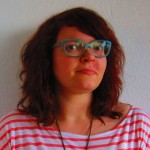
Ana Fabíola Maurício – Co-founder and co-curator of the independent curatorial project “nanogaleria” since September 2018 with Luísa Santos. She is Deputy Director of Católica Doctoral School (CADOS) since September 2023. She was Head of the Research and Innovation Office of UCP (Jan. 2018-Sep. 2023). She was also Project Manager and Researcher for the European Cooperation Project “4Cs – From Conflict to Conviviality through Creativity and Culture”, co-funded by the “Creative Europe: Culture” programme of the European Commission, coordinated by the Faculty of Human Sciences (FCH-UCP) (Jul. 2017-Dec. 2021).
Senior Researcher at CECC | FCH-UCP (Research Centre for Communication and Culture) since 2016, and Junior Researcher since 2010; her research focuses on contemporary art and its contribution to the development of the cultural panorama of societies. She was a recipient of an ESSE (European Society for the Study of English) Collaborative Project Workshop Grant with the project “Teaching in the Era of Digital Humanities: a Multi-Disciplinary Perspective” with three postdoctoral colleagues from Goethe Univ., Frankfurt, Germany; Stockholm Univ., Sweden; and Milan Univ., Italy.
Ana Fabíola Maurício holds a double-program Ph.D. (2016) in Culture Studies by The Lisbon Consortium, FCH-UCP, and in Literary and Cultural Studies by the Graduate Centre for the Study of Culture, Justus-Liebig Universität, Giessen, Germany (co-tutelle European Ph.D. Network – Portugal, Italy, Germany, Sweden, and Finland). She was awarded a Ph.D. grant by the Portuguese Foundation for Science and Technology (2011-2015). She finished her M.A. degree in Media Studies, specialising in Cultural Management and Communication in 2010, and her B.A. degree in Applied Foreign Languages (English-French) in 2007 at FCH-UCP.
Between 2008 and 2009 she worked for the Education Department of history and art museums of Lisbon City Council, having developed, and implemented pedagogical projects. She has participated and presented papers in multiple national and international conferences, symposia, and summer schools since 2009, having worked in the organisation of several academic programmes and events for the CECC as Scientific Research Assistant as well as for The Lisbon Consortium as Project Officer between 2008 and 2012. Since 2010 she has published articles, interviews, translations, and chapters in several books and journals, and since 2018 she has co-curated exhibitions and co-written and published a series of exhibition catalogues. Her co-curatorial projects with Luísa Santos include exhibitions at Appleton – Cultural Association, Amélia de Mello Foundation Gallery – Universidade Católica Portuguesa, Paços – Torres Vedras Municipal Gallery, Ocupart/Livraria Sá da Costa, Tensta Konsthall (Stockholm, Sweden).
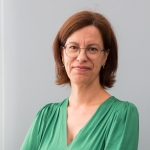
Ana Margarida Abrantes studied English and German at the Universities of Aveiro, Essen and Innsbruck. She holds a Masters Degree in Cognitive Linguistics and a PhD in German Language and Literature, which she completed in 2008 at the Catholic University of Portugal. Between 2006 and 2009 she was visiting scholar at the Center for Semiotics of Aarhus University and at the Department of Cognitive Science at Case Western Reserve University, in Cleveland, USA. Since 2016 she is a member of the Scientific Board for German Studies of DAAD – Deutscher Akademischer Austauschdienst.
Researcher in the line Culture, Translation and Cognition of CECC, her areas of interest are Culture and Cognition, Language and Cognition, Cognitive Poetics and German Studies.
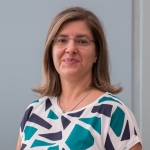
Carla Ganito holds a PhD in Communication Sciences. She is Associate Professor and Coordinator of International Relations at the Faculty of Human Sciences of Universidade Católica Portuguesa (FCH- UCP). Carla Ganito is a main researcher at CECC where she coordinates the group on “Digital Literacy and Cultural Change”. She has been an MC member of the COST Action IS1404 – Evolution of reading in the age of digitization (E-READ).
Carla Ganito lectures in the fields of digital communication, cyberculture, digital transformation. Her research has four main axes: mobile technologies, gender and technology, digital literacy, namely digital reading, and digital life and cultural change. Since 2017 she has been developing a research project on connecting and disconnecting across the life stages, focusing on digital death, and digital rights.
From the most recent publications: (2018) “Gendering old age: The role of mobile phones in the experience of aging for women”, IGI; (2017) “Gendering the mobile phone: A life course approach”, in Digital Technologies and Generational Identity: ICT Usage Across the Life Course, Routledge [book chapter]; (2016) “Women Speak: Gendering the Mobile Phone”, UCP [book]
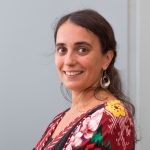
Cátia Ferreira holds a PhD in Communication Studies from the Universidade Católica Portuguesa. She is currently Assistant Professor at FCH-UCP and coordinator of the BA in Social and Cultural Communication and of the Post-Graduate Course in Communication and Content Marketing: Content Marketing Strategies for the Digital Context. She has been a researcher at the Research Center for Communication and Culture since 2008. She has participated in several national and international research projects, to highlight the ongoing participation in the Research project of the Universidad Francisco de Vitoria, Madrid: ‘Las nuevas competências de la prensa deportiva de papel en el futuro ecossistema digital’ and in the European research project: COMPACT: Social Media and Convergence, funded by the European Union, Horizon 2020. She has also integrated several actions of the European COST network, funded by the European Science Foundation. Her areas of research and teaching focus on digital media studies, particularly on: digital games, social media and mobile devices, audiovisual and multimedia communication, emerging content production strategies, such as transmedia and cross-media, content marketing and digital reading and publishing.
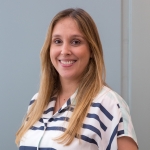
Diana Gonçalves holds a PhD in Culture Studies (2013) from Universidade Católica Portuguesa and Justus-Liebig University of Giessen (double degree). She is currently an Assistant Professor at FCH-UCP, Academic Director of the Lisbon Consortium and Coordinator of the Master’s program in Culture Studies. She is also a researcher at the Research Centre for Communication and Culture (CECC), where she is a member of the research group “Culture, Art and Conflict”. She was Executive Coordinator of the Lisbon Consortium (2016-2017) and co-editor of the online journal Diffractions – Graduate Journal for the Study of Culture (2013-2017). Her main areas of investigation are culture studies, visual culture, American culture and literature, conflict and violence, environment and catastrophes. She is the author of 9/11: Culture, Catastrophe and the Critique of Singularity (de Gruyter, 2016).

Isabel Capeloa Gil is Full Professor of Culture Studies and the current Rector of UCP – Catholic University of Portugal. She holds a B.A. in Modern Languages and Literatures from the University of Lisbon (1987), and an M.A. in German Studies from the same university (1992), as well as a PhD in German Language and Culture from UCP (2001). She was Guest Professor in Germany (Saarbruecken, Munich), United Kingdom, Ireland (National University of Ireland), Italy (Univ. Ca Foscari, Venice), in Brasil (PUC-Rio) and in the USA (U. Pennsilvania and U. Stanford). She is furthermore an Honorary Fellow at the School of Advanced Studies of the University of London. From 2005 to 2012 she was the Dean of the Faculty of Human Sciences at the UCP. She has held numerous visiting professorships at universities in the U.S., Germany, Brazil, Italy, Ireland and Wales. She was a founder of The Lisbon Consortium network and leads the International Doctoral Degree Program in Culture Studies. She is also a senior researcher and founder of the Research Centre for Communication and Culture.
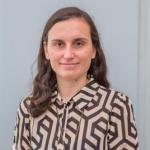
Joana Moura holds Doctoral degree in Comparative Literature from the State University of New York at Stony Brook (2017) and is currently (since 2018) Invited Assistant Professor at FCH, where she teaches languages and translation (English/German). She is a member of the Research Centre for Communication and Culture, working in the Literature and The Global Contemporary project. She also collaborates with the MOV. Moving Bodies: Circulations, Narratives and Archives in Translation at the Centre for Comparative Studies, University of Lisbon. Her main reserach interests lie in the areas of German culture and literature and in translation studies, focusing on genetic translation studies and fictional representations of translator and translation figures in literature and film.
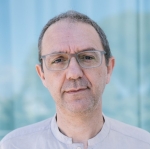
Jorge Fazenda Lourenço is Associate Professor at the FCH – Faculty of Human Sciences, UCP, where he has lectured since 1993, the year when he obtained his PhD in Hispanic Languages and Literatures from the University of California, at Santa Barbara, with a thesis on The Poetry of Jorge de Sena: Witness, Metamorphosis, Pilgrimage, published by the Calouste Gulbenkian Cultural Centre (Paris, 1998). He has published works on Eça de Queiroz, Fernando Pessoa and Jorge de Sena, of whom he is the coordinator of the Complete Works edition (Guimarães Editores). His activities as a researcher have focused on the literatures of the 19th and 20th centuries, on studying Bildungsroman and on questions interrelated with aesthetic modernity, having translated works by E. E. Cummings (xix poems, 1991), Wallace Stevens (Harmónio, 2006) and Charles Baudelaire (O Spleen de Paris, 2007), about whom he organised and wrote the preface to an anthology of critical essays (A Invenção da Modernidade, 2006). He co-edited the minutes to the conferences: the Spanish Civil War: Crossing Borders, 70 Years After (2007), Baudelaire and the Posterities of the Modern (2008) and Jorge de Sena: New Perspectives, 30 Years After (2009). His most recent work, Matéria Cúmplice. Cinco Aberturas e um Prelúdio para Jorge de Sena, won the Jorge de Sena 2012 Award.
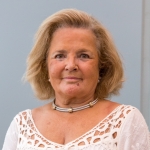
Luísa Leal de Faria is Full Professor in the FCH – Faculty of Human Sciences, UCP – the Catholic University of Portugal, where she served as Vice-Rector between 2004 and 2012. She graduated in Germanic Philology from the Faculty of Letters, University of Lisbon, where she was also awarded the degree of Doctor with the Aggregate title status. She remained with the Faculty of Letters where she developed her academic career through to 2004. She served as General Higher Education Subdirector, National Coordinator of the European Língua and Sócrates Programs, Vice-President of the Scientific Board of the Faculty of Letters, Director of the Department of English Studies, Faculty of Letters, among other academic positions. She currently lectures various curricular units on the Undergraduate, Master’s and Doctoral Degree programs at the FCH, UCP and undertakes research primarily within the field of Culture Studies.
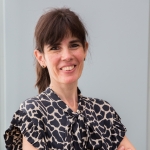
Luísa Santos holds a PhD in Culture Studies by the Humboldt & Viadrina School of Governance, in Berlin, and M.A. in Curating Contemporary Art by the Royal College of Art, in London, Luísa Santos is Assistant Researcher, in Culture Studies / Artistic Studies, since 2019. Between 2016 and 2019, she was Assistant Professor, with a Gulbenkian Professorship, at the Faculty of Human Sciences of the Universidade Católica Portuguesa. She is a research fellow at The European School of Governance (EUSG), in Berlin, since 2019. In 2013 she conducted research in curatorial practices at the Konstfack, in Stockholm. Researcher at the CECC, she is the coordinator of the 4Cs: from Conflict to Conviviality through Creativity and Culture. Luísa Santos sits in the editorial and scientific boards of the peer-reviewed magazines Estúdio, Gama, and Croma and of the Yearbook of Moving Image Studies (YoMIS – Research Group Moving Image Kiel), Büchner-Verlag. Luísa Santos also collaborates in the Arts-based participatory research approach: Potential for exploring Asian-Canadian youth identities through an intersectionality lens, a research project coordinated at the York University. Her main areas of research are contemporary art and social systems. She has authored various publications in the domains of art and society.
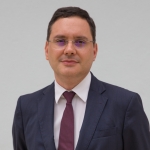
Nelson Ribeiro (PhD in Communication and Culture Studies, University of Lincoln) is the is the Dean of the Faculty of Human Sciences where he also Coordinates the Doctoral Programme in Communication Studies. Member of the Board at the Research Center for Communication and Culture (CECC), he coordinates the research group “Media Narratives and Cultural Memory”. Ribeiro is affiliated with the International Panel on the Information Environment (IPIE) and a member of the Academia Europaea. In 2022 he was the recipient of a fellowship from the Hoover Institution at Stanford University for his research on the relations between Radio Free Europe, the American government, and the Portuguese dictatorship during the Cold War. Presently he is the Chair of the Communication History section at the International Association for Media and Communication Research (IAMCR). He is the founding director of the Lisbon Winter School for the Study of Communication, organized in partnership with the Annenberg School for Communication (University of Pennsylvania), the Chinese University of Hong Kong, the Annenberg School for Communication and Journalism (University of Southern California) and the University of Helsinki. His main research interests are media history, propaganda and disinformation, media and colonialism and journalism studies.
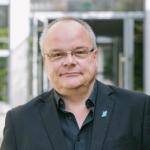
Peter Hanenberg is the Vice-Rector for Research and Innovation, Director of Católica Doctoral School (CADOS). PhD in Modern Languages and Literatures from the University of Bamberg, Germany, in 1993, since 2006 Associate Professor at FCH. From 1988 to 1995 assistant professor at the University of Bamberg and between 1995 and 2006 coordinator of German Studies at the Faculty of Letters of UCP in Viseu. President of the Portuguese German Studies Association (APEG) 2006-2010. Member of the Research Centre for Communication and Culture (CECC) which he coordinates since 2012. 2016-2019 Vice-dean of FCH. His research is dedicated to European literature and culture since the 16th century, the idea of Europe and its representation as well as the intersection of Cognitive Sciences and Culture Studies.

Ricardo Ferreira Reis is Assistant Professor of Accounting, holds a PhD in Business Science and Applied Economics, Wharton School, U. Pennsylvania, USA and a BA in Economics, University of Porto. Prof. Reis teaches Financial Accounting at the MBA, Undergraduate and Executive Education levels at the Católica Lisbon School of Business and Economics. His areas of interest in research are based on informational economics, with an emphasis on Accounting, ranging from agency theory to corporate governance. He previously taught both Cost and Financial Accounting at The Wharton School. Before that, he was attending the Doctorate and Masters Degree in Economics at Universidade Nova in Lisbon, where he also taught a wide range of courses in Economics and Business. Prof. Reis was a consultant for the then Lisbon Stock Exchange and the Porto Derivatives Exchange and he worked as a credit risk analyst for investment banking earlier in his career.
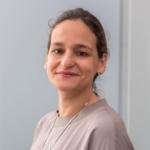
Rita Bueno Maia holds a PhD in Translation History. Following her PhD, she was a postdoctoral fellow at the University of Lisbon Centre for English Studies between 2014 and 2016. Her postdoctoral project The Moveable Feast: Literature in Portuguese Exile deals with popular novels, translated and non-translated, published in Portuguese in Paris by the mid-19th century She has a B.A. in Modern Languages and Literatures and a taught-MA in Comparative Literature from the University of Lisbon. She has been teaching Spanish as a foreign language since 2011 and has taught modules on research methodology in Translation History. She is a freelance translator working in the tourism industry and has also published literary translations. Regarding future publications, she is currently co-editing a special issue of Translation Studies (Taylor and Francis Group) entitled Indirect Translation: Theoretical, Methodological and Terminological Issues and the volume Los límites del Hispanismo: nuevos métodos, nuevas fronteras, nuevos géneros (Peter Lang).
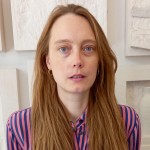
Sara Eckerson is Invited Assistant Professor at FCH-UCP. She received her PhD in Literary and Cultural Studies, with a specialization in Literary Theory, from the University of Lisbon (2016), an MA from the same institution (2009), and a BA from New York University (2006). Her main areas of research are in aesthetics and literary studies, specifically musical hermeneutics, the philosophy of music, and connections between music and literature; her research focuses on the music of Beethoven and Handel, as well as on the literary works of John Milton and Herman Melville. She is the author of numerous publications in this area, including on the philosophy of music (Teorema), Handel and Milton (Yale Journal of Music and Religion), Beethoven (Manchester Beethoven Studies, published by the Manchester University Press), and has collaborated with the editorial board of Eighteenth-Century Studies (Johns Hopkins University Press).
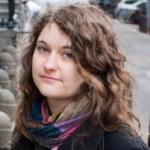
Verena Lindemann Lino holds a PhD in Culture Studies form Universidade Católica Portuguesa and University of Giessen (double degree). Since 2022 she is invited assistant professor at the Faculty of Human Sciences at the Universidade Católica Portuguesa. She is a researcher at the Research Centre for Communication and Culture where she is currently developing the projects Archives of (In)hospitality. She is a member of the editorial board of Diffractions – Graduate Journal for the Study of Culture. Her main research areas include transculturality, (trans)cultural memory, translation theory and comparative literature. She edited, among others, Negotiations of Migration (De Gruyter 2021) and is the author of Remembering World War II Refugees in Contemporary Portugal (De Gruyter 2021) as well as several articles on transcultural phenomena, memory and translation.
Visiting Professors
2023/2024
Ilios Willemars (University of Leiden)
Ipshita Chanda (Foreign Languages University, Hyderabad)
Maura Marvão (International specialist and consultant for 20th century and contemporary art)
2022/2023
Anders Michelsen (University of Copenhagen)
Laura Erber (Leiden University)
Lucia Boldrini (Goldsmiths, University of London)
Maura Marvão (International specialist and consultant for 20th century and contemporary art)
Susanne Weber-Mosdorf (Specialist and consultant for public administration and management)
Benjamin Weil (CAM, Fundação Calouste Gulbenkian)
2021/2022
Laura Erber (Visiting Professor at the University of Copenhagen and Centre of Latin American Studies)
Maura Marvão (International specialist and consultant for 20th century and contemporary art)
Niall Martin (University of Amsterdam)
Susanne Weber-Mosdorf (Specialist and consultant for public administration and management)
2020/2021
Carles Guerra
João Cezar de Castro Rocha (Universidade do Estado do Rio de Janeiro)
Laura Erber (Visiting Professor at the University of Copenhagen and Centre of Latin American Studies)
Susanne Weber-Mosdorf (Specialist and consultant for public administration and management)
2019/2020
Carles Guerra (Pompeu Fabra University)
Daniel Blaufuks (artist)
Hans Ulrich Gumbrecht (Stanford University)
Nuno Crespo (Universidade Católica Portuguesa – Porto)
2018/2019
Álvaro Barbosa (Faculty of Creative Industries – University of Saint Joseph)
Ana Bernstein (Federal University of the State of Rio de Janeiro – UNIRIO)
Daniel Blaufuks (artist)
Uwe Wirth (Justus Liebig University of Giessen)
Paulo Soeiro de Carvalho
2017/2018
Álvaro Barbosa (Faculty of Creative Industries – University of Saint Joseph)
Angela Locatelli (University of Bergamo, Italy)
Frederik Tygstrup (University of Copenhagen)
Laura Mulvey (Birkbeck College – University of London)
Paulo de Medeiros (University of Warwick)
2016/2017
Álvaro Barbosa (Faculty of Creative Industries – University of Saint Joseph)
Esther Peeren (University of Amsterdam)
Andrea Póczik (Pázmány Péter Catholic University)
Christoph Wulf (Free University of Berlin)
2015/2016
Karl Erik Schøllhammer (Puc-Rio)
Knut Ove Eliassen (NTNU)
2014/2015
Kai van Eikels (Free University of Berlin)
2013/2014
Octavian Saiu (University of Bucharest)
2012/2013
Frank Stern (Univ. Wien)
Kai Sicks and Martin Zierold (Univ. Giessen)
2011/2012
Frederik Tygstrup (University of Copenhagen)
Joyce Goggin (Univ. Amsterdam)
2010/2011
Ansgar Nünning & Vera Nünning (Univ. Giessen; Univers. Heidelberg)
Monroe Price (Annnenberg School for Communication – Univ. Pennsylvania)
2009/2010
Lawrence Grossberg (University of North Carolina)
Wolfgang Müller-Funk (Universität Wien)
2008/2009
Biagio d’Angelo (PUC – S. Paulo)
Elisabeth Bronfen (Universität Zürich/New York University)
2007/2008
Barbie Zelizer (Annenberg School for Communication – University of Pennsylvania)
Gabriele Brandstetter (Freie Universität Berlin)
Invited speakers
Aleida Assmann (Universität Konstanz)
Alexandre Castro Caldas (Universidade Católica Portuguesa)
Alison Ribeiro de Menezes (University of Warwick)
Álvaro Barbosa (University of Saint Joseph, Macau)
Aamir Mufti (University of California, Los Angeles
Amira Hanafi (artist)
Amit Pinchevski (The Hebrew University of Jerusalem)
Ana Gabriela Macedo (Universidade do Minho)
André Lepecki (New York University)
Andreas Huyssen (Columbia University)
Anne Tomiche (Sorbonne University)
Ansgar Nünning (University of Giessen)
Anton Kaes (UC Berkeley)
Antonio Monegal (Universitat Pompeu Fabra)
António Sousa Ribeiro (Universidade de Coimbra)
Ariel Salleh (University of Sydney/Nelson Mandela University)
Ariella Azoulay (Brown University)
Arjun Appadurai (New York University)
Asko Lehmuskallio (Tampere University)
Ben Anderson (Durham University)
Bill Fontana (sound artist)
Carles Guerra (MACBA, Barcelona)
Catherine Perret (Nanterre University, Paris X)
Christiane Schoenfeld (U. Galway)
Christoph Lindner (Amsterdam School of Cultural Analysis)
Claudia Benthien (University of Hamburg)
Corinne Mellul (Institute Catholique du Paris)
Daniel Blaufuks (artist)
David Slocum (New York University)
David Wellbery (University of Chicago)
Djamila Ribeiro (Pontifícia Universidade Católica de São Paulo)
Doris Bachmann-Medick (University of Giessen)
Edward Soja (UCLA)
Elena Esposito (Università di Modena e Reggio Emilia)
Ellen Sapega (University Madison)
Eric Rentschler (Harvard University)
Esther Peeren (Amsterdam School for Cultural Analysis)
Frederik Tygstrup (University of Copenhagen)
Filipa Lowndes Vicente (Universidade de Lisboa)
Frank Stern (Univ. Wien)
Fritz Breithaupt (Indiana University Bloomington)
George Yúdice (University of Miami)
Gonzalo de Polavieja (Champalimaud Foundation)
Gustavo Cardoso (ISCTE)
Guta Moura Guedes (curator)
Hanif Kureishi
Hans Bertens (University of Utrecht)
Hans-Joachim Backe (IT University of Coenhagen)
Hans Ulrich Gumbrecht (Stanford University)
Haun Saussy (University of Chicago)
Henry Jenkins (UCSD)
Hubert Zapf (University of Augsburg)
Igor Štiks (University of Edinburgh)
Irit Rogoff (Goldsmiths College)
Jean-François Chougnet (curator)
Jennifer Wenzel (Columbia University)
Jeremy Gilbert (University of East London)
Jess Auerbach (African Leadership University)
João Falcato (Oceanário de Lisboa)
João Ferreira Duarte (Universidade de Lisboa)
John Durham Peters (Yale University)
John Sundholm (Stockholm University)
Jonathan Hart (University Alberta, Canada)
Joseph Heathcott (New School for Social Research, NY)
Karl Erik Schøllhammer (PUC-RIO)
Katarzyna Murawska-Muthesus (Birkbeck College, University of London)
Kathy-Ann Tan (independent curator and scholar)
Kitty Millet (San Francisco State University)
Knut Ove Eliassen (Norwegian University of Science and Technology)
Krzysztof Nawratek (University of Sheffield)
Laura Mulvey (Birkbeck College)
Lawrence Buell (Harvard University)
Lawrence Venuti (Temple University)
Leo Spitzer (University Dartmouth)
Leticia Sabsay (London School of Economics and Political Science)
Liedeke Plate (Radboud University)
Liliane Weissberg (University of Pennsylvania)
Loredana Polezzi (Cardiff University)
Lúcia Boldrini (Goldsmiths, University of London)
Luís Gustavo Martins (School of the Arts – Universidade Católica Portuguesa)
Malcom Miles (writer and researcher)
Manfred Schmeling (Univ. des Saarlandes)
Manuel Portela (Universidade de Coimbra)
Marc Augé
Marcelo Brodsky (artist)
Márcio Seligmann Silva (Unicamp, Brasil)
Margarida Calafate Ribeiro (Universidade de Coimbra)
Margherita Laera (University of Kent)
Maria do Rosário Lupi Bello (Open University, Portugal)
Maria Josep Balsach (Universidad de Girona)
Maria Luísa Berwanger da Silva (UFRGS – Brasil)
Marianne Hirsch (Columbia University)
Marie-Laure Ryan (Independent Scholar)
Marita Sturken (New York University)
Mark Turner (Case Western Reserve University)
Martha Rosler (Artist)
Martin Zierold (Karlshochschule International University)
Marvin Carlson (City University of New York)
Maura Marvão (PhillipsAuction House)
Maureen Freely (English Pen, University of Warwick)
Maurizio Lazzarato (Matisse / CNRS University Paris I)
Michael Cronin (Dublin City University)
Michael delli Carpini (University of Pennsylvania)
Michael Schudson (Columbia University)
Michele Cometa (University of Palermo)
Mieke Bal (University of Amsterdam)
Monika Schmitz-Emans (Univ. Bochum)
Nanna Bonde Thylstrup (Aarhus University)
Naomi Segal (Birkbeck College – University of London)
Nav Haq (Museum of Contemporary Art Antwerp)
Niall Martin (University of Amsterdam)
Nicholas Mirzoeff (New York University)
Nina Berman (photographer)
Nuno Ferrand (Universidade do Porto/CIBIO-INBIO)
Nuno Maulide (University of Vienna)
Paola Mildonian (Univ. Ca Foscari, Venice)
Paulo de Medeiros (University of Utrecht; University of Warwick)
Paulo Soeiro Carvalho (General Director for Economy and Innovation at Lisbon City Council)
Pepita Hesselberth (University of Leiden)
Per Aaage Brandt (Case Western University)
Péter Forgács (media artist and filmmaker)
Peter Greenaway (filmmaker)
Philip Auslander (Georgia Institute of Technology)
Pirjo Lyytikainen (University of Helsinki)
Renato Rizzi (Instituto Universitario di Architettura – Venice)
Richard Grusin (U. Madison, Wisconsin-Milwaukee)
Richard J. Williams (University of Edinburgh)
Robert Wilson (Director, Watermill Foundation)
Roberto Vecchi (U. Bologna)
Robert Adams (Heriot-Watt University, Edinburgh)
Rui Carvalho Homem (Universidade do Porto)
Rui Catalão (Performer)
Ruth Rosengarten (curator)
Samuel Weber (Northwestern University)
Sandra Bermann (Princeton University)
Semir Zeki (University College London)
Stefan Kaegi (Rimini Protokoll)
Susanne Weber-Mosdorf
Terence Wright (Ulster University)
Timothy Garton Ash (University of Oxford)
Thomas Elsaesser (University of Amsterdam)
Tony Bennett (Centre for Cultural Research – University of Western Sydney)
Uwe Wirth (University of Giessen)
Venuturupalli Rao (City College of New York)
Vera Mantero (choreographer)
Vera Nünning (Heidelberg University)
Viriato Soromenho-Marques (Universidade de Lisboa)
Xavier Antich (U. Girona; Fundación Tapiés)
Xiaomei Chen (UC Davis)
